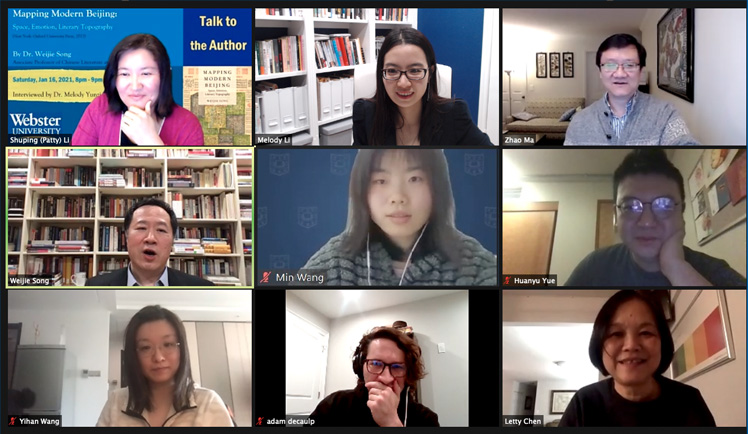Confucius Institute Debuts Author Talk Series
January 26, 2021

On Jan. 17, the Webster University Confucius Institute hosted its first speaker in the Chinese Urban Study Author Talk Series. Weijie Song, associate professor of modern Chinese literature and culture at Rutgers University, spoke to an online audience about his book, Mapping Modern Beijing: Space, Emotion, Literary Topography. Attracting an audience of over 70 people, Song’s talk was well-received and generated a long stream of questions and follow up discussion. The discussion was moderated by Melody Yunzi Li, assistant professor of Chinese literature at the University of Houston.
Song’s talk, like his book, explored the literary topography of Beijing by a broad range of modern authors, investigating how they “map” the city in terms of emotional archives, spatial consciousness, and historical memory. Providing a framework for this approach, he identified different modes and methods of how writers perform an affective mapping of the city. For example, the great writer and Manchu bannerman Lao She envisions a “warped hometown” navigated by spatial metamorphoses and emotional vicissitudes in streets, courtyard houses, ditch, and teahouse. Popular novelist Zhang Henshui depicts Beijing as a compilation of fleeting urban snapshots and everlasting manners and emotions. Female intellectual and architect Lin Huiyin draws an “aesthetic city” that captures the picturesque dimension of Beijing vis-à-vis the political environment. In addition, Song addressed the outer city, the inner city, and the fictional city underneath the Forbidden City constructed in comparative works by Lin Yutang, Princess Der Ling, and Victor Segalen, highlighting the pleasure and pitfalls of collecting local knowledge and presenting cosmopolitan visions. He also brought to the limelight a displaced Beijing in Sinophone writings and post memory by diasporic Beijing natives Liang Shiqiu and Tang Lusun, Taiwan sojourners Zhong Lihe and Lin Haiyin, and Hong Kong émigré martial arts writer Jin Yong. As the first Anglophone book-length study of the “literary topography” of Beijing, Song’s book makes a unique contribution to the study of Chinese urban culture. His critical methodologies and erudite scholarship inspire many, as our audience has commented.
In this event, Song also shared some of his newest research. One project explores environmental humanities and ideological objects, such as smokestacks, which evoke different feelings and emotions throughout modern and contemporary literary, cinematic, and artistic representations. “Chivalrous Psychogeography” seeks to chart a cultural and emotional topograhy of martial arts world constructed by five leading avant-garde film directors in Hong Kong, Taiwan, and mainland China from the Cold War to the post-Cold War eras. The third project “Reviving Northeast China” examines Dongbei as a distinct heterotopia, enclave, and “non-place” beyond the Shanhai Pass and the Great Wall evidenced in the 21st century literary and cinematic imaginations. In the latter part of the talk, a lively question and answer session revealed a deep level of audience engagement.
Feb. 20: Steven Hochstadt, Exodus to Shanghai: Stories of Escape from the Third Reich
The Chinese Urban Study Author Talk Series will continue to feature a variety of authors throughout the year. The next scheduled event will feature Steven Hochstadt, professor emeritus of history at Illinois College, discussing his book Exodus to Shanghai: Stories of Escape from the Third Reich. The talk will be held at 8 p.m. CT on Feb. 20, and will be moderated by Warren Rosenblum, Webster University professor of History, Politics, and International Relations. Click here for more information on this talk.
